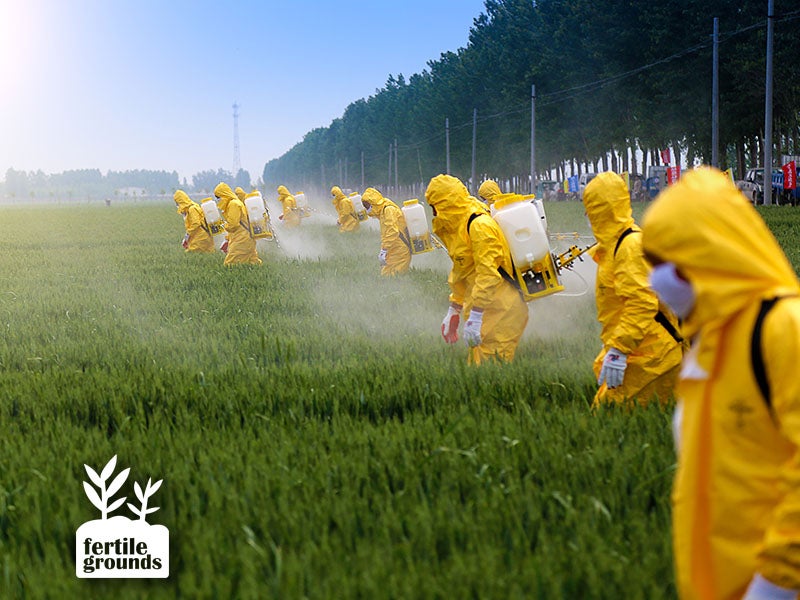Enlist Duo Is Back Again, so We’re Back in Court
A toxic herbicide just won EPA approval despite posing serious risks to human health and wildlife.

This page was published 8 years ago. Find the latest on Earthjustice’s work.
The EPA just approved use of the toxic herbicide Enlist Duo on millions of acres of genetically engineered corn, soybeans and cotton in 34 states. Earthjustice lawyers, on behalf of farmers, conservation groups and food and farmworker justice organizations, are fighting back in court against this decision, which could put human health and wildlife at risk. (My colleague, Paul Achitoff, is handling the case and co-wrote this blog post.)
Enlist Duo was created to eradicate so-called “superweeds,” which have evolved resistance to earlier generations of herbicides like Monsanto’s Roundup. Enlist Duo packs a one-two punch of highly toxic weed-killing chemicals: glyphosate and 2,4-D.
Glyphosate, the primary ingredient in Roundup, is a probable human carcinogen that has also been linked to the plunge in monarch butterfly populations. The other component of Enlist Duo, 2,4-D, has been linked to Parkinson’s disease, non-Hodgkins lymphoma and reproductive problems, and it has a tendency to drift through the air onto neighboring fields. This chemical was a component of the infamous Vietnam-era defoliant Agent Orange and could pose a threat to endangered species, including whooping cranes and Indiana bats, which are likely to eat insects that have been exposed to 2,4-D. The EPA’s own estimates show that American children could now be exposed to 2,4-D through eating, inhalation and skin contact at levels that the World Health Organization, Russia, Australia, South Korea, Canada, Brazil and China all consider unsafe.
Glyphosate, the primary ingredient in Roundup, is a probable human carcinogen that has also been linked to the plunge in monarch butterfly populations.
In addition to the health risks of Enlist Duo, organic farmers and small family farmers who avoid genetically engineered crops worry about contamination from widespread use of the herbicide. Enlist Duo could drift onto their fields and kill or contaminate their crops, which are not designed to survive the chemical onslaught.
This story might sound familiar because this is the second lawsuit Earthjustice has had to file to stop this toxic chemical. After the first legal challenge, in 2014, the EPA decided to reconsider whether it should approve Enlist Duo without greater safety protections. A year later, the EPA not only decided to forego any such protections, but the agency also authorized use of the chemical over an even larger area. Like the weeds it’s supposed to destroy, Enlist Duo just keeps coming back.
This is the way our system of industrial agriculture works. Giant corporations like Monsanto and Dow sell powerful chemicals that kill weeds and pests, in conjunction with crops that are genetically modified to withstand them. When the pests inevitably evolve resistance, the companies bring a new batch of more potent chemicals—and corresponding engineered crops—to market. By approving each new batch of engineered crops and the chemicals only they can withstand, the EPA is helping scale up the toxicity of the chemicals used in agriculture nationwide.
By approving each new batch of engineered crops and the chemicals only they can withstand, the EPA is helping scale up the toxicity of the chemicals used in agriculture nationwide.
Is there any way to stop this escalation? Some farmers avoid toxic pesticides and engineered crops by diversifying their operations. On these farms, varied crops, domestic animals and healthy soil function cooperatively to minimize pests and maximize production. Natural techniques like cover-cropping and crop rotation also promote healthy soil and reduce pests. A long-term study of crop rotation in Iowa has demonstrated that this strategy can cut herbicide use by as much as 90 percent while maintaining high yields and profits.
Though these holistic techniques are starting to gain popularity, diverse farms are still not the dominant model of agriculture in the United States. If they were, Americans would eat a lot more vegetables and a lot less meat and processed food, and we wouldn’t drive cars fueled by corn ethanol. For health, climate and conservation, this would be a big improvement.
The reality is that we don’t have the federal policies in place to help scale up this diverse style of farming and support farmers who want to make positive change. U.S. farm policy, by and large, supports the large-scale production of corn, soybeans and wheat in engineered monocultures that require chemical fertilizers and pesticides.
Earthjustice and other groups are pushing for the kind of whole-scale agricultural reform that will lead to a healthier, more efficient and more sustainable food system. In the meantime, we’ll continue to hold the EPA accountable for keeping toxic chemicals out of our air, water and food—one harmful herbicide at a time.
About this series
Fertile Grounds is a blog series that examines the challenges and opportunities in ensuring access to healthy, sustainable and affordable food for all. We talk about the entire lifecycle of food—from seed selection and planting to consumption and disposal—because there is potential for improvement throughout. We’re informed by the expertise of our many clients and allies and by Earthjustice’s years of work to ban harmful pesticides, encourage sustainable farming methods, reduce pollution, support farmworker justice and promote a healthy relationship between farmers and communities.
Earthjustice’s Sustainable Food and Farming program aims to make our nation’s food system safer and more climate friendly.